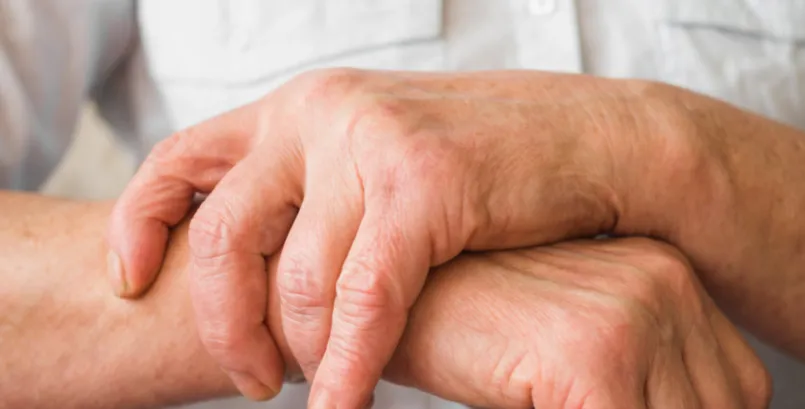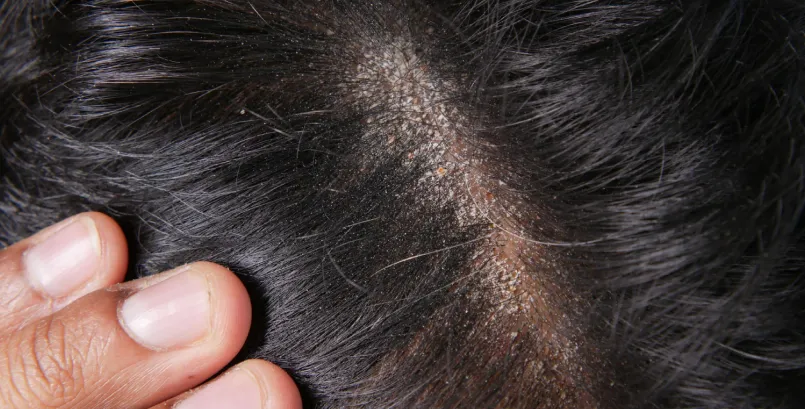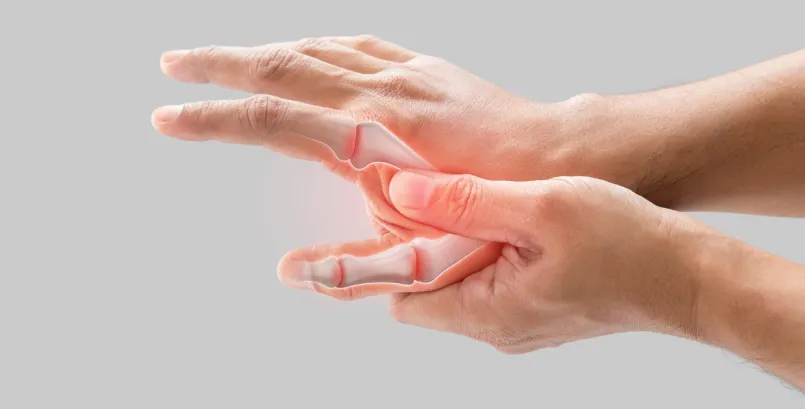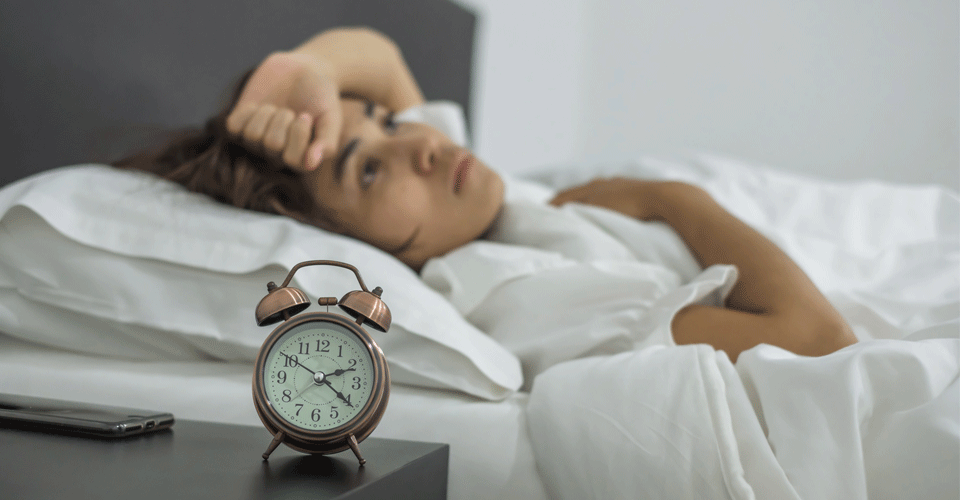
By Dr. Arun Radhesh R | January 24, 2023
Table of Contents
- How Does Ayurveda Treat Insomnia And Sleep Disorders?
- Common Ayurvedic Remedies For Insomnia & Sleep Disorders
- Lifestyle Changes Recommended By Ayurveda To Improve Sleep
- Ayurveda’s Guidelines For Diet & Nutrition
- Yoga Poses & Pranayama Techniques To Promote Restful Sleep
- Herbal Formulations Used In Treating Sleep Disorders
- Symptoms of Insomnia
- Causes of Insomnia
- How to Prevent Insomnia
- Diagnosis: When to See a Doctor
- Treatment for Insomnia
- Types of Insomnia
- Scientific View vs Ayurvedic View – Comparison Chart
- Sleep Hygiene Tips
- Conclusion
- FAQs
Insomnia and other sleep disorders are highly disruptive to one’s life and can devastate one’s physical, emotional, and mental well-being. Fortunately, Ayurveda, an ancient Indian healing system, has been used to treat insomnia and other sleep issues for thousands of years. Keep reading to learn more about the efficacy of this time-honored treatment and how it might help you get a better night’s rest.
Ayurveda, a holistic medicine from India, dates back over 5,000 years. It is founded on the idea that mental, physical, and spiritual balance is necessary for good health and well-being. Ayurvedic treatment for insomnia and sleep disorders frequently focuses on reestablishing the body’s equilibrium through dietary adjustments, lifestyle modifications, and herbal remedies.
Our Happy Customers
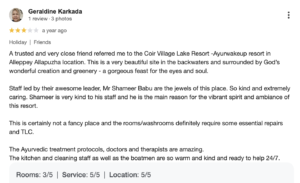

How Does Ayurveda Treat Insomnia And Sleep Disorders?
Even though sleep is a vital component of our lives, it is frequently one of the first things to suffer when stressed or unwell. As a result, there may be a vicious cycle whereby insufficient sleep causes more stress and anxiety, which in turn causes even less sleep. Ayurveda may be beneficial if you are trying to get some rest but have been unsuccessfully battling insomnia or another sleep disorder.
- It uses diet, lifestyle, and herbal remedies to restore harmony to the mind and body. Herbal remedies that induce a state of calm and relaxation are frequently used in this treatment.
- Ashwagandha, Brahmi, and Gotu Kola are some Ayurvedic herbs commonly used to treat sleeplessness.
- Herbal supplements, teas, and oils are all viable delivery mechanisms for plants. Ashwagandha, in particular, has been shown to be effective in studies for lowering stress and enhancing sleep.
- Ayurveda suggests changing one’s routine. This includes not consuming caffeine after 2 p.m., following a soothing bedtime ritual, and sleeping in a cool, dark room.
By following these, one can finally start getting the quality sleep one needs and deserves.
Common Ayurvedic Remedies For Insomnia & Sleep Disorders
Ayurvedic medicine holds that optimal health is attained when an individual’s mental, physical, and spiritual selves are in harmony. The symptoms of insomnia and other sleep disorders can be treated with various Ayurvedic methods. Some common ones include
- Herbal teas
Having an herbal tea right before bed can help calm one’s nerves and put one to sleep. Teas made from chamomile, lavender, and passionflower are all excellent choices.
- Aromatherapy
Diffusing or adding calming essential oils like lavender or chamomile to a warm bath can help one unwind and get a good night’s sleep.
- Ayurvedic herbs
Ayurveda recognizes a wide variety of herbs as effective remedies for sleeplessness. Brahmi, Ashwagandha, Shankhapushpi, Jatamansi, and Vacha are just a few of the more well-known ones. These can be taken in capsule form or as tea.
- Yoga and meditation
These are good practices to try before bed because they help relax the body and mind for a good night’s rest.
Lifestyle Changes Recommended By Ayurveda To Improve Sleep
Ayurveda may suggest several lifestyle adjustments to aid in getting a better night’s rest. These include
- Maintaining a calm, dark, and quiet bedroom devoid of electronic devices can help one sleep.
- Developing and adhering to a regular pattern of sleeping throughout the night.
- Avoid caffeine, alcohol and spicy foods in the evening.
- Relaxing in a hot bath before bed.
- Try some yoga or meditation right before bedtime to help one unwind.
Ayurveda’s Guidelines For Diet & Nutrition
Ayurvedic medicine approaches sleep problems from several angles, including dietary and nutritional adjustments, behavioral modifications, and the use of herbal remedies. The following are some general dietary and nutritional guidelines for the treatment of sleep disorders and insomnia
- Eat fresh, whole foods that are easy to digest.
- Avoid processed foods, alcohol, artificial additives, and caffeine.
- Include a wide variety of fresh fruits and vegetables in your daily diet. Be sure to balance your diet with raw and cooked foods.
- Relaxing in a hot bath before bed.
- Get in eight glasses of water, fruit juice, herbal tea, soup, and stew daily.
Yoga Poses & Pranayama Techniques To Promote Restful Sleep
Pranayama and yoga are two ayurvedic practices that can help with sleeplessness. Several yoga postures and breathing exercises (called pranayama) have been shown to aid in deep, rejuvenating sleep. Here are some of the most effective
- Child’s pose
This pose is excellent for relieving stress and anxiety while stretching the hips and lower back.
- Corpse pose
This very calming pose helps to relax the mind and body.
- Legs up the wall pose
This simple but effective pose helps to relieve tension in the legs and lower back and can also help to calm the mind.
- Breath of fire
This powerful pranayama technique helps to energize and detoxify the body and promote deep breathing, which is calming and relaxing.
- Alternate nostril breathing
It is an effective pranayama method for easing into slumber because it promotes a state of calm and relaxation by balancing the activity in the brain’s left and right hemispheres.
Herbal Formulations Used In Treating Sleep Disorders
Many herbal formulations can be used to treat insomnia and other sleep disorders, each with its unique set of benefits. Some of the most commonly used herbs in Ayurvedic medicine for treating sleep disorders include
- Ashwagandha
This medicinal plant has been used for centuries in Ayurvedic medicine for its sedative effects. Stress and anxiety contribute to a lack of sleep, so it is frequently used to alleviate those conditions.
- Brahmi
Another herb with calming properties, Brahmi can be helpful in the treatment of sleep disorders. It is recommended for those who want to enhance their sleep quality and mental capacity because of its purported ability to enhance memory and cognitive function.
- Shankhapushpi
Shankhapushpi is an herb traditionally used as a natural sedative. If you have insomnia, this may be the solution you’ve been looking for because it can help you fall asleep faster and stay asleep longer.
Symptoms of Insomnia
People with insomnia facing difficulties with one or more of these common symptoms:
- Difficulties for asleep at night
- wakefulness during the night
- Early waking up
- Persistent tiredness after a full night’s sleep
- Excessive sleepiness during daytime or lack of energy
- Impatience, anxiety, or unhappiness
- Focusless and memory problems
- creating more mistakes or accidents
- Chronic headacheproblems
- Stomach issues or improper digestion
- Over thinking about not sleeping
- Issues while social interactions
If these signs occur often, it may be chronic insomnia (lasting 3 months or more).
Causes Insomnia?
Insomnia may occur for several reasons. Your body, mind, lifestyle,and environment all are contributing to it.
Physical Causes:
- Long term pain or exhaustion
- Asthma, heart conditions, or backflow (GERD)
- Parkinson’s disease or Alzheimer’s
- Sleep apnea (breathing stops during sleep)
- Hyperthyroidism (overactive thyroid)
- Arthritis
- Brain tumors, strokes, or injuries
- Hormone variations (like during periods or pregnancy)
- Brain tumors, strokes, or injuries
- Hormone variations (like during periods or pregnancy)
Psychological Causes:
- Depression
- Anxiety or constant worrying
- Bipolar disorder
- Easily getting stressed from work, school, or family
Environmental or Lifestyle Causes:
- Jet lag (travel across time zones)
- Night shift or sudden changes work schedules
- Harsh or restless sleeping environment
- Sleeping with snoring partner
- Late eating habits or consumption of caffeine food at night
- Over watching of phones or watching TV in bed
- Overthinking or having an hyperactive mind
Even temporary events, like an unsatisfactory day or shocking news, can cause short-term insomnia.
How to Prevent Insomnia
You can prevent or reduce insomnia by following healthy sleep habits, also called sleep hygiene:
- Get bed and wake up at the same time every day
- Stop over consumption of caffeine, tea, or energy drinks in the evening
- Give proper rest for eyes from phones or screens 30–60 minutes before bedtime
- Avoid heavy meals at night
- Boost your habits like reading, meditation, or light stretching
- Get bed only for sleeping—not for work or scrolling social media
- Make sure your room is clean,cool and calm friendly
Habits which can help to train your brain to fall asleep naturally and stay asleep longer
Diagnosis: When to See a Doctor
If you notice that you are struggling with sleep issues, it’s important to consult your doctor. They may ask about:
- Your past medical record
- Your daily routine
- Your emotions or stress levels
- Your sleep time routine
They may also want to know about your sleep diary to track when you sleep, wake up, and how rested you feel.In rare cases, they might suggest a sleep study to check for hidden problems like sleep apnea.
Treatment for Insomnia
There are two main types of treatments: non-medical and medical.
Non-Medical Treatments:
- Sleep hygiene training (fixing your bad sleep habits)
- Cognitive Behavioral Therapy (CBT-I): a special kind of therapy that helps you to get relief from negative thoughts and behaviors around sleep
- Relaxation techniques like breathing exercises or guided sleep meditations
These are safe and often more effective in the long run.
Medical Treatments:
- Doctors may prescribe sleeping pills if needed for temporary period to improve your sleeping habits
- Some people use non-prescription medicines like antihistamines—but these can have side effects
- Always consult to a doctor before using any sleep medicine
Types of Insomnia
Insomnia means trouble falling asleep, staying asleep, or waking up too early. It’s the most common sleep disorder, affecting millions of people worldwide.
There are two main types of insomnia:
1. Acute Insomnia
- Lasts a few days or weeks
- Often caused by stress or big life changes
- Usually retreats on by its own
2. Chronic Insomnia
- Occur at least 3 times a week for 3 months or more
- May treated by therapy or sleep coaching
But did you know there are many more types of insomnia? Let’s look into 11 different types and what causes them.
3. Adjustment Insomnia
This may come to pass during a big life change—like moving, entering a new job, getting married, or losing a loved one. Stress and change make it hard to sleep, but it generally gets better once life feels normal again.
4. Drug-Induced Insomnia
fixed medications, caffeine, alcohol, nicotine, or cannabis can make it tougher to sleep. Even stopping these substances suddenly (withdrawal) can cause insomnia.
5. Comorbid Insomnia
This type happen along with another health condition, such as:
- Depression or anxiety
- Heart disease
- Asthma or long term pain (like arthritis or cancer)
Health issues and insomnia may affect each other
6. Sleep Onset Insomnia
This means you have difficulties in falling asleep at the start of the night. Common causes include:
- An over thinking mind
- Working on phones or screens too late
- Not feeling comfort before bed
Try relaxing 30–60 minutes before bed to calm your brain.
7. Middle Insomnia
You wake up in the middle of the night and can’t fall back asleep. This can be reasoned by:
- Pain
- Hot flashes during menopause
- Stress
- Alcohol
8. Late Insomnia
You wake up too early before your alarm—and can’t go back to sleep. Often linked to:
- Emotional pressure
- Blood sugar variations
- Circadian rhythm disorders
9. Conditioned Insomnia
The condition that your brain forces you to wake up, not sleeping. This often happens after tossing and turning many nights in a row. Some people sleep better in a hotel or friend’s house because their brain doesn’t connect that place with stress.
✅ Tip: Only go to bed when you’re sleepy. If you can’t sleep, get up and do something relaxing such as reading or listening to music.
10. Behavioral Insomnia of Childhood
This can occur in young kids (usually under age 5). It may be reasoned by:
- Lack of proper bedtime routine
- Requiring a parent to fall asleep
- Waking up and leaving the bed at night
Without healthy sleep habits, it can lead to bad mood and problems in school.
11. Idiopathic Insomnia
This is chronic insomnia with no clear cause. But new research shows it may be due to a hyperactive nervous system—your body stays conscious and ready, even when it should be resting.
12. Paradoxical Insomnia
In this type, people feel like they’re not sleeping, but sleep tests show they actually are getting rest. It’s more about how the brain perceives sleep than actual sleep time.
13. Sleep Hygiene Insomnia
Bad bedtime habits cause this type. Examples include:
- Using your phone while you are in bed
- Consuming coffee or energy drinks at night
- Keep same time for bed in every day
- Not wanted light or noise in your room
✅ Good sleep hygiene means having a consistent bedtime, avoiding screens, and keeping your room calm and quiet.
Scientific View vs Ayurvedic View – comparison chart

Sleep Hygiene Tips
| Topic | Ayurvedic Sleep Hygiene | General Sleep Hygiene (Scientific) |
|---|---|---|
| Why It is important | Helps Ojas (vital energy), immunity, mental clarity, and emotional balance. | Bad sleep increases stress, anxiety, and chances for depression. It also affects studying and focus. |
| Night Routine (Ratri Charya) | Encouraging routine with light food, warm bath, meditation, and oil massage. Avoid screen use. | Same: Encouraging routine will help the brain prepare for sleep. Avoid screens and heavy mental excitements. |
| Sleeptime | Sleep between 10 PM – 6 AM to line up with natural dosha cycle and circadian rhythm. | Sleep at a consistent time every night, ideally before midnight, to improve the body clock. |
| Dinner Time | Eat minimal dinner by sunset or at least 2 hours before sleep for good digestion. | Same: Stop heavy meals late at night. Digestion affects sleep quality. |
| Supportive Herbs | Use supportive herbs like Ashwagandha, Brahmi, Jatamansi, and Tagara. | Use melatonin, magnesium, or herbal teas like chamomile or lemon balm. |
| Massage (Abhyanga) | Apply warm sesame oil to feet (Padabhyanga) and head before bed. Soothes Vata and mind. | Not generally practiced, but warm showers or body relaxation techniques are encouraged. |
| Meditation & Breathing | Practice Anulom Vilom (alternate nostril breathing) and mindfulness meditation. | Do deep breathing, progressive muscle relaxation, or guided meditation to relax the brain. |
| Set your sleep space | Keep your room dark, quiet, and cool. Diffuse oils like lavender or camphor to keep calmness. | Same: Use blackout curtains, earplugs, white noise, and cool temperature for ideal sleep. |
| Screen Time | No phones, TVs, or devices 1–2 hours before bed. Save mind energy. | Same: Blue light delays melatonin and sleep. Use “night shift” mode or avoid screens completely. |
| Mental Health Connection | Insomnia is often caused by Vata imbalance (too much mental function). Balance the doshas. | Stress and overthinking activate the brain and delay sleep. CBT-I and routines help rebuild sleep habits. |
| Caffeine & Alcohol | Avoid over consumption of coffee, tea, stimulants, and alcohol — especially after evening. | Same: Caffeine and alcohol may disturb your sleep cycles. Best to avoid in the evening. |
| Exercise | Gentle yoga is supported — like moon salutations or stretching before bed. | Exercise is supportive, but should be done at least 3 hours before bedtime. |
Conclusion
Ayurveda is a great way to treat insomnia and sleep disorders naturally. It can aid in reestablishing equilibrium, decreasing stress and anxiety, enhancing digestion, normalizing hormone levels, and altering behaviors that may contribute to poor sleep. In addition, ayurvedic treatments, such as herbal remedies or dietary adjustments, can help you get back to a healthy sleep schedule in no time. So, give it a try today!
Faqs
1. Which doctor should I consult for sleeplessness?
2. How to pronounce insomnia?
3. How to sleep early when not tired?
- Fix a particular wake-up time for every day – Even on weekends.
- Apply the 90-minute sleep cycle rule – Work backward from your wake-up time in blocks of 90 minutes.
- Create a supportive bedtime routine – Read a book, dim the lights, or do deep breathing.
- Avoid overuse of screens and caffeine at night.
- Get to bed at the same time every day to train your body.
4. Which vitamin deficiency causes insomnia?
- Vitamin B12: Helps control melatonin levels.
- Vitamin D: Deficiency can affect sleep quality.
- Vitamin C & E: May disrupt sleep cycles if deficient.
- Potassium: Supports muscle relaxation for better sleep.
It’s best to check your vitamin levels and eat a healthy, balanced diet.
5. Is insomnia genetic?
6. Is insomnia hereditary?
7. Can insomnia cause a heart attack?
8. Why does insomnia happen during pregnancy?
- Hormonal variations
- Continuous urination at night
- Back pain or leg cramps
- Heartburn or nausea
- Stress or anxiety about the baby
To sleep better, try morning sunlight, eat pistachios or drink tart cherry juice, and avoid blue light from screens before bed. Using magnesium lotion or essential oils like cedarwood may also help relax your body.
Always talk to your doctor before trying new remedies during pregnancy.
